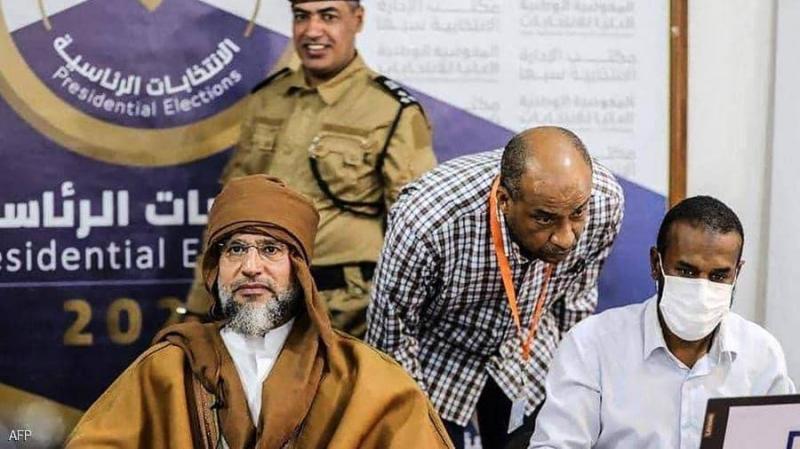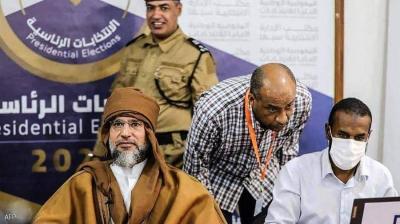Under the title "Gaddafi's Son Returns in His Father's Cloak... and the Gamble is in the Hands of the Green Movement," Sky News Arabia published a report about Saif al-Islam Gaddafi’s candidacy for the Libyan presidential elections. The site described Gaddafi's appearance while submitting his candidacy papers, showing him with a long beard touched with gray and wearing the traditional Libyan robe famous for his father, in the same brown color he favored. It noted that Saif al-Islam, the son of the late president Muammar Gaddafi, has returned to the forefront as a candidate to succeed his father in a decision aware of its consequences amid a surrounding environment that blends the waters of his supporters with the fires of his opponents.
Immediately after the news of Saif al-Islam (49 years old) submitting his candidacy papers at the electoral administration office in Sebha in southwestern Libya, differing opinions about his candidacy emerged both domestically and abroad. His opponents quickly turned to media outlets affiliated with the terrorist Brotherhood organization to obtain a statement from the spokesperson of the International Criminal Court (ICC) regarding the arrest warrant issued against Saif al-Islam in 2011 to stand trial for accusations related to the killing of protesters opposing his father that year, emphasizing that the warrant remains in effect.
In the city of Zawiya to the west, what is referred to as the "leaders and revolutionaries of Zawiya" declared their rejection of the candidacy of those described as "wanted for justice," including Saif al-Islam, threatening in a statement not to open electoral centers in the city and to engage in a "war of unknown dimensions.” However, what the ICC announced and the threats from militias appear to have little effect on Saif al-Islam's legal standing, as the electoral commission declared that he has completed the necessary legal prerequisites.
### Tribal Popularity
Libyan analysts reviewed the internal and external prospects for Gaddafi's son in the elections for Sky News Arabia. Political analyst Mohamed al-Asmar noted that he enjoys significant support from the tribes spread across the country, especially in Sirte, his birthplace. He added that the tribes in Tarhuna, Beni Walid, and Shwerif in the west support him, along with his popularity from Sebha to Jafra, and in Ghat (southwest) and its surroundings. These areas are known for their loyalty to the previous regime, even self-identifying as the "Green Movement," referring to Libya's green flag during Gaddafi's rule, according to al-Asmar. Regarding his chances in the competition, he believes they "will not be easy," as there are multiple factions, and the elections are tied to international stances; however, Saif al-Islam remains a difficult contender.
### International Stances
The United States expressed its discontent clearly, with acting Assistant Secretary of State for Near Eastern Affairs, Joey Hood, previously stating that "the world has a problem" with Saif al-Islam's candidacy. He justified this by saying, "The people of Libya will decide... but he is a war criminal, listed under UN and US sanctions, and remains subject to an outstanding arrest warrant issued by the ICC."
Meanwhile, Russian Foreign Minister Sergey Lavrov called on Saturday for all political forces to be allowed to run, including "supporters of the Gaddafi regime," for the elections to be "inclusive."
### Expected Scenarios
Political analyst Tarek al-Farjani expected one of two scenarios: either "Saif al-Islam retracts his candidacy due to international pressures, or he continues his path to face the West, which will not recognize him." He warned that Saif al-Islam is participating in elections that his father prohibited during his rule, thanks to the sacrifices of the Libyan National Army that restored security to a vast area of the country, allowing Saif al-Islam to run without fear for his safety. Regarding his being wanted by the ICC, Ramzi al-Rumaih, an advisor to the Libyan National Security Studies Organization, responded that Libyan law is "sovereign" and does not stipulate prohibiting candidacy for those being tried internationally.




